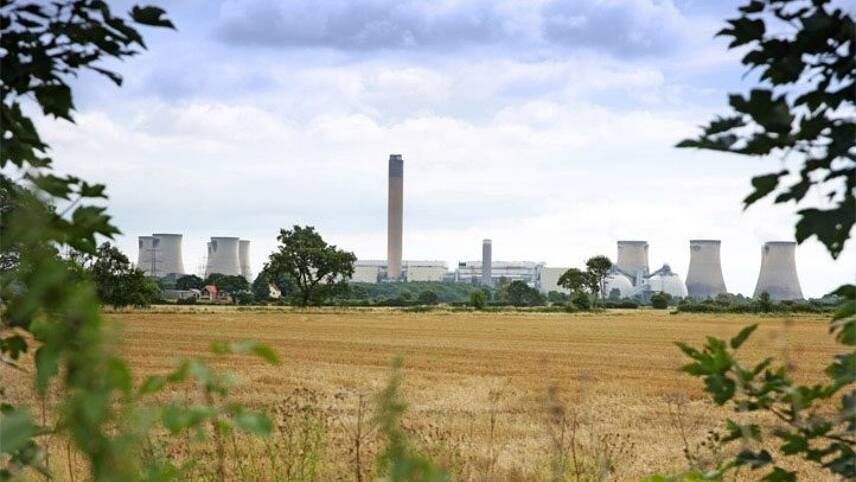Register for free and continue reading
Join our growing army of changemakers and get unlimited access to our premium content

Pictured: Drax's power plant in Selby
In a letter sent to Boris Johnson and peers today (2 July), the coalition argues that the burning of biomass would “undermine the UK’s net-zero target and its desire to be a climate leader on the global stage”. While burning biomass generates some 85% fewer emissions than burning coal, it is not a carbon-neutral method of energy production and the production of pellets often contributes to deforestation. To this latter point, land use is estimated to account for 23% of man-made emissions. Trends like deforestation also reduce a habitat’s ability to sequester carbon.
According to the groups signing the letter, which have more than two million members collectively, subsidies for biodiversity would be better invested in wind and solar projects “built in harmony with nature”. The document argues that these solutions have not only had their climate benefit proven but that they are cheaper than biomass – especially when it is co-located with carbon capture and storage (CCS), as it is at Drax’s Selby power plant.
On the price of wind and solar, the UK Government last year updated its price forecasts for renewable generation. Changes included a halving of offshore wind costs through to 2030. On CCS, Drax recently announced an ambition to host the world’s largest negative emissions project this decade, after partnering with Mitsubishi Heavy Industries to scale up existing CCS infrastructure. It first began capturing carbon in early 2019.
Sources cited in the letter include Chatham House’s 2020 report which cautioned against the use of BECCS as a “silver bullet” and a more recent report from Ember, which claimed that Drax’s BECCS plant would receive £10bn in subsidies from the UK Government over its lifetime. Ember’s report also argued that BECCS does not have a “clear benefit for the climate”.
After previously stating that the figures used in the Ember report “were based on outdated assumptions and a new-build biomass and CCS (BECCS) power plant rather than a retrofit”, and after updating its biomass strategy to strengthen sustainable procurement requirements, Drax has defended its continued support of BECCS today.
A spokesperson told edie that the UN’s Intergovernmental Panel on Climate Change (IPCC) has “clearly stated that sustainable biomass is low-carbon and renewable and that its use is critical to achieving global climate targets”, reaffirming this stance as recently as 2019.
The spokesperson also denied the letter’s claim that Drax is “the biggest tree burner in the world”, adding: “We have repeatedly stated that Drax does not burn whole trees or trees harvested solely for bioenergy. Our sustainable biomass pellets are produced from the material left over from when forests are harvested for other sectors – such as construction and furniture. The forests in the US South that we source most of our biomass from have doubled in growth since the 1950s.”
The letter’s signatories are RSPB UK, WWF UK, Friends of the Earth Scotland, the Wildlife Trusts, Greenpeace, the Campaign Against Climate Change, Wildlife and Countryside Link, the Soil Association, Sustain, Feedback Global, Fern, Biofuelwatch and the English, Welsh, Scottish and Northern Irish arms of Friends of the Earth.
Biomass strategy
The publication of the letter comes as the Department for Business, Energy and Industrial Strategy (BEIS) prepares a new Biomass Strategy, as it promised to in response to the Climate Change Committee’s (CCC) 2020 progress report to Parliament.
The strategy is tabled for publication, in full, in early 2022, following Covid-19-related delays – but guidance on BECCS specifically may be published beforehand. Unlike the Department’s previous bioenergy plans, the new Strategy will consider the impact of biomass on forests globally, setting out international governance on sourcing. It will also explore the need for co-location with CCS. It will include a date from which bioenergy without co-located CCS will be banned. The EU is also in the process of developing new biomass frameworks, with more than 500 scientists arguing that changes should end subsidies from the bloc itself and from member states.
Proponents of UK BECCS include the Energy Saving Trust and Association for Renewable Energy and Clean Technology (REA), the latter of which estimates that bioenergy could account for 16% of the nation’s primary energy supply by 2032.
However, it is worth noting that public support for biomass – with or without CCS – does not seem to be strong in the UK. In a 2020 YouGov poll, 55% of respondents said the Government should not subsidise biomass and more than three-quarters said biomass should not be classed as renewable.
Sarah George


Wind and solar are entirely beyond our control or demand. A bit of a downside!
Just what would be the "85% fewer emissions" that biomass emits, less than coal. I assume complete combustion?
Richard Phillips